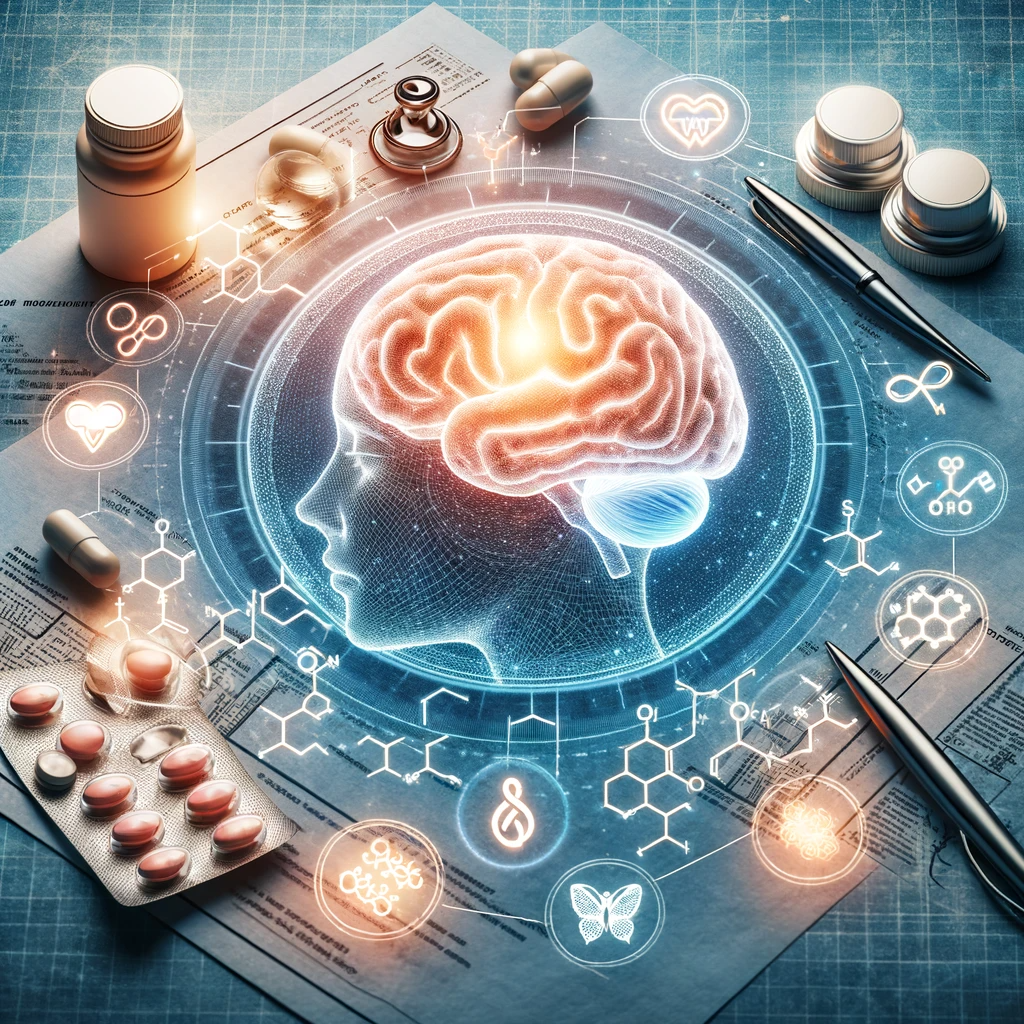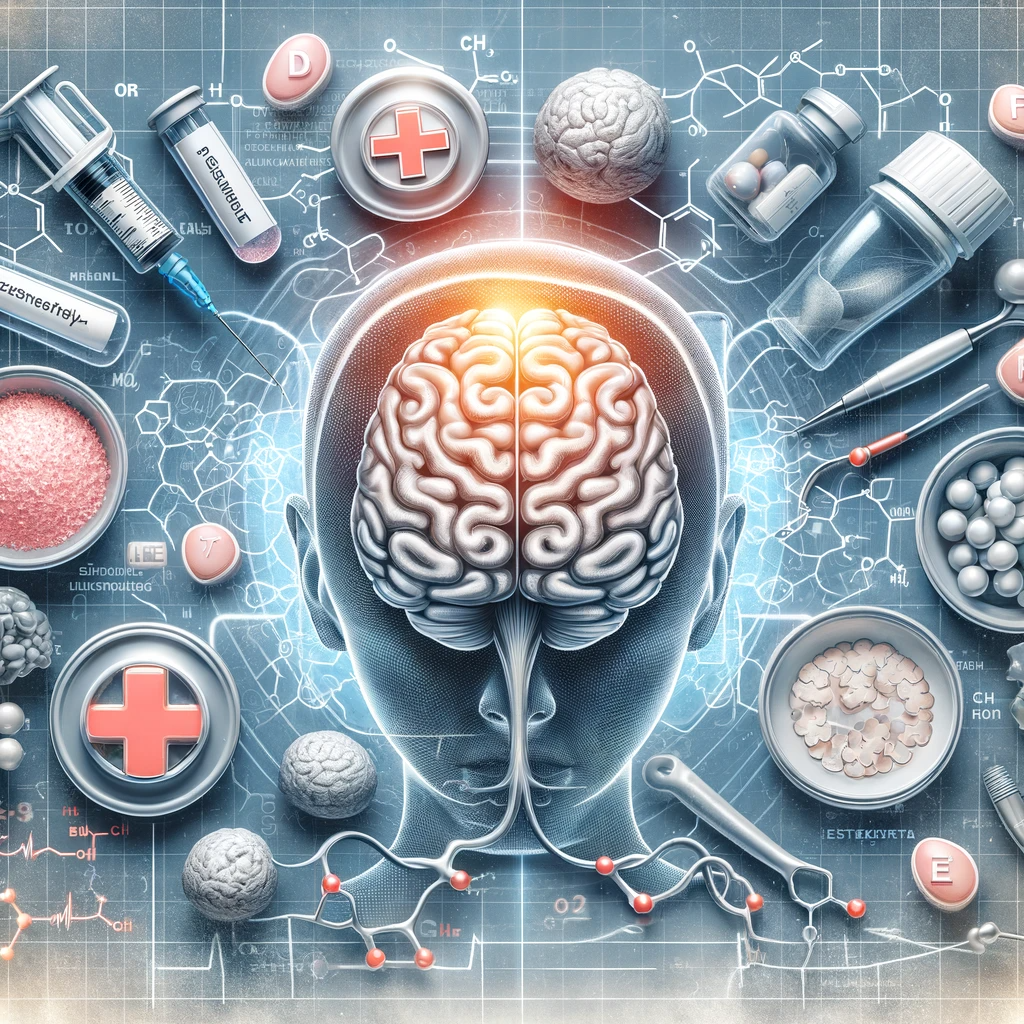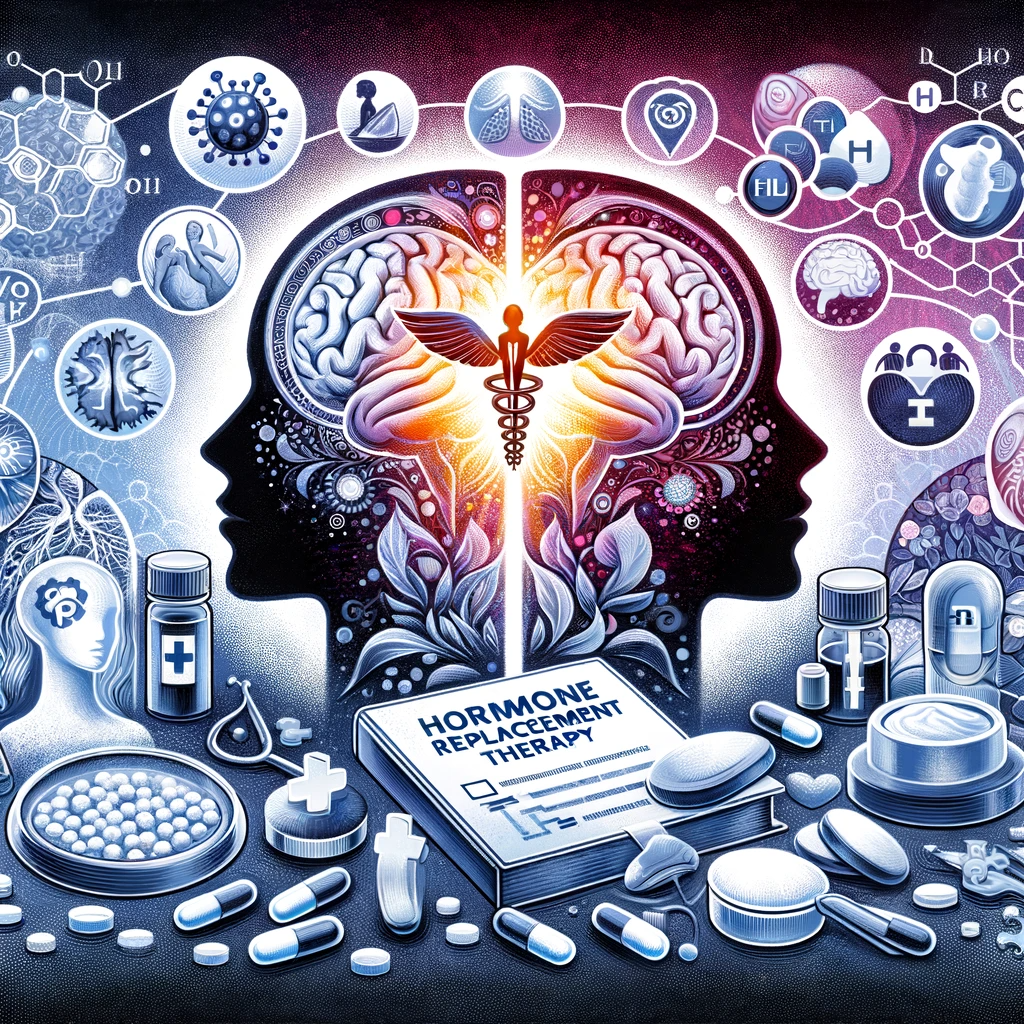Dementia in Women: Examining the Role of Estrogen-Only Therapy in Hormone Replacement Therapy
Explore the complex relationship between estrogen-only hormone replacement therapy and dementia risk in women. This in-depth analysis delves into clinical studies, highlighting how hormonal changes post-menopause might influence the development of Alzheimer's and other dementias in women.

Dementia, particularly Alzheimer's disease, is a significant concern, especially among women. Research has been delving into the relationship between hormone replacement therapy (HRT), specifically estrogen-only therapy, and the development of dementia in women. This article explores the intricate connections and implications of estrogen-only therapy on dementia risk, referencing findings from clinical trials and studies by institutions like the National Institute on Aging.
Understanding Hormone Replacement Therapy: A Closer Look at its Impact on Women's Health
Hormone Replacement Therapy (HRT) plays a crucial role in managing menopausal symptoms for many women. This therapy primarily involves the administration of hormones to offset the decline in estrogen levels that occur during menopause. Here, we delve deeper into the nuances of HRT, focusing particularly on estrogen-only therapy and its implications for women's health, including brain health and the risk of developing conditions like dementia.
What is Hormone Replacement Therapy?
Alleviating Menopausal Symptoms: HRT is primarily used to relieve common symptoms of menopause, such as hot flashes, night sweats, mood swings, and vaginal dryness. These symptoms result from the natural decrease in the body's estrogen levels.
Types of Therapy: Hormone therapy can include estrogen alone (estrogen-only therapy) or a combination of estrogen and progesterone (combination therapy). The choice of therapy often depends on whether the woman has undergone a hysterectomy.
Estrogen-Only Therapy Explained
For Hysterectomy Patients: Estrogen-only therapy is typically prescribed to women who have had their uterus removed via hysterectomy. In these cases, progesterone is not necessary because there is no risk of endometrial cancer, which progesterone in HRT helps to prevent.
Hormone Therapy Clinics: Women seeking HRT, including estrogen-only therapy, often visit hormone therapy clinics where healthcare providers can tailor treatment plans based on individual needs and health profiles.

Research on HRT and Women's Health
Focus on Brain Health: Extensive research has been conducted to understand how estrogen-only HRT affects various aspects of women’s health, particularly brain health. This includes exploring how HRT might influence the risk of developing neurological conditions such as Alzheimer's disease.
Dementia and Alzheimer’s Disease: Studies have shown that there is a higher prevalence of dementia and Alzheimer’s disease in women compared to men. This has led researchers to examine whether HRT could potentially influence these risks, given estrogen's known effects on the brain.
Estrogen's Role in Brain Function
Protection Against Cognitive Decline: Estrogen is believed to have a protective effect on the brain, potentially guarding against cognitive decline. However, the timing and duration of estrogen therapy appear to be critical factors in determining its effectiveness and safety.
Weighing the Risks and Benefits
Personalized Treatment Decisions: Women considering HRT, especially those concerned about dementia and cognitive health, should have in-depth discussions with their healthcare providers. This includes understanding the potential benefits and risks associated with estrogen-only therapy.
Clinical Trials and Studies: Ongoing clinical trials and studies continue to provide valuable insights into how HRT, particularly estrogen-only therapy, affects the risk of developing dementia in women.
Hormone Replacement Therapy: A Balanced Approach
Considering Individual Health Profiles: When deciding on HRT, it’s important to consider individual health histories, including risk factors for heart disease, osteoporosis, and cancer. Each woman’s therapy should be customized based on her specific health needs and family history.
Understanding hormone replacement therapy, particularly estrogen-only therapy, is vital for women navigating menopause. The decision to use HRT should be made after carefully considering individual health risks and benefits, and in consultation with healthcare professionals. As research continues to evolve, it will further guide women and their healthcare providers in making informed decisions about using HRT for managing menopausal symptoms and protecting long-term health.

Estrogen Therapy and Dementia Risk: A Critical Analysis
The link between estrogen-only therapy and dementia risk in women has become an increasingly important area of study. With dementia, particularly Alzheimer's disease, being more prevalent in women, understanding this connection is crucial for women's health.
Prevalence of Dementia in Women
Higher Rates in Women: Statistics reveal that dementia, and specifically Alzheimer's disease, is more common in females than males. In the United States, of the over 6 million individuals living with Alzheimer's, nearly two-thirds are women. This gender disparity raises critical questions about the contributing factors, including hormonal influences.
Estrogen-Only Therapy and its Link to Dementia
Concerning Research Findings: Recent research has highlighted a possible association between estrogen-only hormone replacement therapy and an increased risk of developing dementia in women. These findings are significant considering that hormone replacement therapy, particularly estrogen therapy, is commonly prescribed to women experiencing menopausal symptoms.
Clinical Trials and Studies: Clinical trials, including those conducted by organizations like the National Institute on Aging, have been pivotal in bringing this association to light. These studies have examined the long-term effects of hormone therapy on women's cognitive health.
Understanding the Role of Estrogen in Brain Health
Estrogen's Impact on the Brain: Estrogen is known to play a role in the functioning of brain cells and can influence brain health. It has been suggested that estrogen might have protective effects against cognitive decline, but the timing and duration of estrogen therapy seem to be critical factors.
Alzheimer's Disease in Women
Disproportionate Effect: Alzheimer's disease, the most common form of dementia, shows a marked prevalence in women. Research is ongoing to understand why Alzheimer's tends to be more common in females, exploring factors like longevity, genetic predispositions, and hormonal changes.

Risks of Estrogen-Only Therapy
Increased Dementia Rates: The use of estrogen-only therapy, particularly in postmenopausal women, has been linked to higher rates of dementia. This finding is crucial for women considering hormone therapy as a treatment for menopausal symptoms.
Implications for Treatment Decisions: Women, especially those with risk factors for dementia or a family history of Alzheimer's disease, should weigh the risks and benefits of estrogen-only therapy in consultation with their healthcare providers.
Navigating Hormone Therapy Decisions
Informed Choices: Women considering hormone therapy should engage in detailed discussions with their hormone therapists or healthcare providers. Understanding the potential impact of estrogen-only therapy on brain health and dementia risk is a key part of this decision-making process.
Personalized Healthcare Approach: Decisions regarding hormone replacement therapy should be personalized, taking into account each woman's health history, risk factors, and specific needs.
Future Research Directions
Need for Further Studies: Ongoing research and clinical trials will continue to shed light on the complex relationship between estrogen therapy and dementia risk in women. This research is critical for developing guidelines that can help women make informed decisions about hormone therapy.
In summary, the relationship between estrogen-only therapy and the risk of dementia in women is a complex and significant issue in women's health. It underscores the importance of personalized medical advice and careful consideration of the risks and benefits of hormone therapy. As research in this field progresses, it will provide clearer insights and guidance for women navigating these crucial health decisions.
Clinical Trials and Research Findings
A notable study in Denmark involved a nested case-control study focusing on women aged 50 to 60 years with a history of hysterectomy. The study, following these women until 2018, aimed to assess the link between estrogen-only use and dementia. Findings indicated that estrogen-only therapy was associated with an increased dementia rate. This conclusion was drawn from data involving hormone therapy prescriptions and subsequent dementia diagnosis.

Implications for Women's Health
The study’s results have significant implications for women considering hormone therapy. While hormone replacement therapy has been effective in treating menopausal symptoms, its potential impact on mental health and the risk of developing neurological disorders like Alzheimer's cannot be overlooked.
The Gender Disparity in Alzheimer's
Understanding why Alzheimer's is more prevalent in women than men is crucial. While longevity plays a role, as women generally live longer than men, other factors such as biological and genetic variations are being investigated. For instance, the risk of Alzheimer's for a woman at age 65 is 1 in 5, a statistic that underscores the urgency in understanding and addressing this disparity.
Role of Estrogen in Brain Function
Estrogen is known to have a protective effect on the brain. However, the timing of hormone therapy initiation and the type of estrogen used are critical factors. The study highlighted that even short-term use of estrogen therapy near menopause was associated with increased dementia rates.
Research Conclusion and Recommendations
This research emphasizes the need for a careful approach when considering hormone therapy, especially estrogen-only therapy, in managing menopausal symptoms. Women, especially those with risk factors for dementia or a family history of Alzheimer's disease, should discuss the benefits and risks of hormone therapy with their healthcare providers.
Further research is necessary to fully understand the causal relationship between hormone therapy and dementia risk. Meanwhile, women are encouraged to adopt a healthy lifestyle, including physical exercise and a balanced diet, as potential measures for reducing the risk of dementia.
As the medical community continues to explore the complex relationship between estrogen therapy and dementia, women must stay informed and proactive about their health choices, particularly when it comes to hormone replacement therapy.

Implications for Women's Health
The study’s results have significant implications for women considering hormone therapy. While hormone replacement therapy has been effective in treating menopausal symptoms, its potential impact on mental health and the risk of developing neurological disorders like Alzheimer's cannot be overlooked.
The Gender Disparity in Alzheimer's: Exploring the Underlying Factors
The prevalence of Alzheimer's disease in women compared to men is a significant area of concern in medical research. This gender disparity in Alzheimer's has prompted numerous studies and clinical trials to understand the underlying causes. It is known that women generally live longer than men, which partially explains the higher incidence. However, longevity alone does not account for the entire disparity, leading researchers to explore other factors, such as biological and genetic variations, that may contribute to this difference.
Longevity and Alzheimer’s Disease
Impact of Longer Life Expectancy: Women typically have a longer life expectancy than men, which increases their overall exposure to the risk of developing Alzheimer's. Since age is the greatest known risk factor for Alzheimer's, this extended lifespan contributes significantly to the higher incidence in women.
Biological and Genetic Factors
Estrogen's Role: Estrogen, a hormone that plays a key role in women's health, is believed to affect brain function. Researchers are investigating how changes in estrogen levels during menopause might influence the development of Alzheimer's disease.
Genetic Variations: Genetic factors also contribute to the risk of developing Alzheimer's. For instance, the presence of the APOE-e4 gene variant, more common in women, is associated with a higher risk of Alzheimer's.
Alzheimer’s Disease: Male vs. Female
Differences in Disease Progression: Studies indicate that Alzheimer's disease progresses differently in women than in men, with women showing a faster cognitive decline. Understanding these differences is crucial for developing gender-specific treatment approaches.

Increased Risk in Women
Statistical Data: For a woman at age 65, the estimated lifetime risk of developing Alzheimer's is 1 in 5. In contrast, the risk for men is lower, highlighting the need for focused research on why women are more susceptible.
Alzheimer’s Association and Research: Organizations like the Alzheimer's Association are actively involved in research to understand the gender ratio in Alzheimer's and provide resources for those affected.
Lifestyle and Health Factors
Heart Disease and Cardiovascular Health: Conditions like heart disease, which are known risk factors for Alzheimer's, tend to manifest differently in women, possibly influencing the onset and progression of dementia.
Mental Health Considerations: Women's mental health, particularly depression, is being studied for its potential impact on Alzheimer's risk.
Implications for Prevention and Treatment
Personalized Healthcare Strategies: Acknowledging the gender disparity in Alzheimer's necessitates personalized prevention and treatment strategies. This includes considering different risk profiles and treatment responses between men and women.
Role of Hormone Therapy: The use of hormone replacement therapy in postmenopausal women and its impact on Alzheimer's risk is a subject of ongoing research.
Future Directions in Research
Clinical Trials and Studies: Continued research and clinical trials are vital to unravel the complex factors contributing to the higher prevalence of Alzheimer's in women. This research is essential for developing targeted interventions and therapies.
In conclusion, the gender disparity in Alzheimer's disease highlights the need for a deeper understanding of the unique risk factors and disease progression in women. By focusing on gender-specific research, the medical community can develop more effective strategies for prevention, diagnosis, and treatment of Alzheimer's in women, ultimately reducing the burden of this devastating disease.
Role of Estrogen in Brain Function
Estrogen is known to have a protective effect on the brain. However, the timing of hormone therapy initiation and the type of estrogen used are critical factors. The study highlighted that even short-term use of estrogen therapy near menopause was associated with increased dementia rates.
Conclusion and Recommendations
This research emphasizes the need for a careful approach when considering hormone therapy, especially estrogen-only therapy, in managing menopausal symptoms. Women, especially those with risk factors for dementia or a family history of Alzheimer's disease, should discuss the benefits and risks of hormone therapy with their healthcare providers.
Further research is necessary to fully understand the causal relationship between hormone therapy and dementia risk. Meanwhile, women are encouraged to adopt a healthy lifestyle, including physical exercise and a balanced diet, as potential measures for reducing the risk of dementia.
As the medical community continues to explore the complex relationship between estrogen therapy and dementia, women must stay informed and proactive about their health choices, particularly when it comes to hormone replacement therapy.
FAQ's
What is Hormone Replacement Therapy (HRT)?
HRT is a treatment used to relieve symptoms of menopause by replacing hormones that the body no longer produces, primarily estrogen.
What is Estrogen-Only Therapy?
Estrogen-only therapy is a type of HRT given to women who have undergone a hysterectomy, involving the administration of estrogen without progesterone.
How Does Estrogen-Only Therapy Relate to Dementia Risk in Women?
Recent studies have shown a potential link between estrogen-only therapy and an increased risk of dementia, particularly Alzheimer's disease, in women.
Is Alzheimer's More Common in Women Than Men?
Yes, Alzheimer's disease is more prevalent in women. Nearly two-thirds of Americans with Alzheimer’s are women.
What Are the Risk Factors for Developing Dementia in Women?
Key risk factors include age, genetic predisposition, hormonal changes post-menopause, and lifestyle factors like heart disease and mental health.
Can Hormone Therapy Clinics Provide Guidance on Dementia Risk?
Yes, hormone therapy clinics can offer advice on the benefits and risks of HRT, including its potential impact on dementia risk.
What Are the Warning Signs of Dementia in Women?
Early warning signs include memory problems, difficulty in performing familiar tasks, changes in mood or behavior, and impaired reasoning or judgment.
How Is Alzheimer’s Disease Diagnosed in Women?
Diagnosis typically involves a combination of medical history evaluation, cognitive and neurological tests, and sometimes brain scans.
Can Lifestyle Changes Reduce the Risk of Dementia in Women?
Yes, adopting a healthy lifestyle, including regular physical activity, a balanced diet, and mental stimulation, can contribute to reduced dementia risk.
Are There Clinical Trials Focused on Women, Dementia, and Hormone Therapy?
Yes, there are ongoing clinical trials investigating the relationship between hormone therapy and dementia risk in women, with the aim of better understanding and managing this risk.





